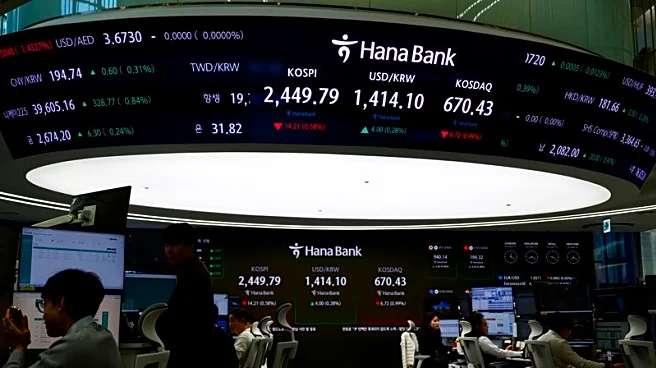By Gaurav Dogra
(Reuters) -Asian equities saw strong inflows in September, boosted by the U.S. Federal Reserve’s first rate cut in nine months, expectations of further easing this year, and a weaker dollar
that lifted demand for regional assets.
Foreign investors bought a net $7.68 billion worth of regional stocks in September, marking their fourth monthly purchase in five months, data from stock exchanges in Taiwan, India, South Korea, Thailand, Indonesia, Vietnam and the Philippines showed.
The U.S. Federal Reserve lowered its benchmark interest rate by a quarter of a percentage point last month and indicated more cuts would follow at meetings in October and December.
"The US Federal Reserve’s rate cut helped support inflows into the region," said Khoon Goh, head of Asia research at ANZ.
AI-linked semiconductor exporters drew robust foreign investment last month, with South Korean stocks receiving $5.11 billion, the largest monthly inflow since February 2024, and Taiwanese stocks attracting $6.59 billion in net foreign purchases.
"Taiwan and South Korea will likely continue to benefit from elevated demand for high precision chips," ANZ's Goh said.
Cross-border investors also bought Philippine and Indonesian stocks of $46 million and $27 million, respectively, in September.
Foreigners, however, divested a net $2.7 billion of Indian stocks for a third successive monthly net sale and ditched Vietnamese and Thai stocks worth $1.02 billion and $371 million, respectively, last month.
Analysts said regional equities tend to perform well when the Fed starts easing and U.S. growth remains firm, with additional support from Asian central banks that have room to cut rates amid a softer dollar.
Goldman Sachs expects further upside for Asian equities, forecasting 8% price and 10% total returns over 12 months for the MSCI Asia-Pacific ex-Japan index, citing accommodative policy, a softer dollar, and stronger earnings growth.
It sees regional earnings growth rising to 13% in 2026 from 8% this year, driven by a China profit rebound and continued AI-fueled strength in the tech sector, with upgrades for Korea and Taiwan.
(Reporting by Gaurav Dogra and Patturaja Murugaboopathy in Bengaluru; Editing by Mrigank Dhaniwala)









